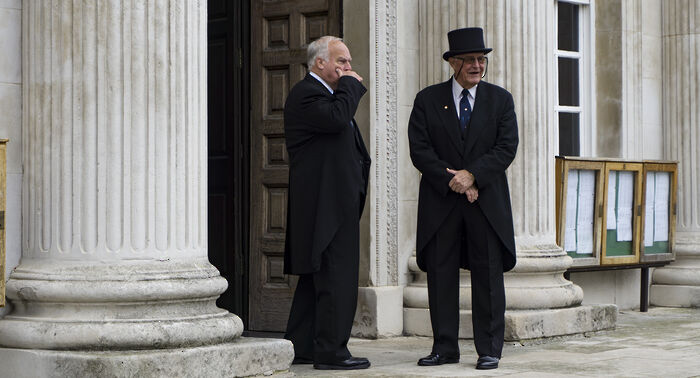The winners and losers of the class lists saga
The class lists debacle has (almost) reached its end. Varsity breaks down who got what they wanted from a turbulent journey lasting nearly three years

In a move which ends the almost three-year saga of class lists, the University has decided to implement a simple opt-out option for students who wish to have their names removed from the public display of results, published both at the Senate House and online in the Cambridge University Reporter.
Cambridge is approaching the end of the journey which started in mid-2015 and has been covered by Varsity at every stage.
From its start in June 2015 to its end, the journey has involved everyone from students to CUSU, student campaigns to senior University officials, and the creator of the Tompkins Table whose rankings have, for the time being, been saved from their demise.
Class lists: winners and losers
Our Grade, Our Choice Neutral
The class lists saga was triggered in June 2015 when the Our Grade, Our Choice campaign, which was led by Jesuan students Nadine Batchelor-Hunt and Freya Sorrell, among others, started a petition for an easy opt-out system which garnered over 1,200 signatures. The campaign then pushed for CUSU to keep its stance in favour of abolishing class lists. Now, over two years later, its original wish has been fulfilled.
Speaking to Varsity, the campaign said, “It is frustrating that this has taken so long, and we still believe abolition is the right course of action - but this is a step in the right direction.”
The establishment abolitionists Losers
The University’s move towards abolition was revealed by Varsity in April 2016, which followed Our Grade, Our Choice’s petition the previous year. One of the main proponents of abolition was Graham Virgo, pro-vice-chancellor for education, who was forced to retreat after students and Regent House both rejected the idea.
Other key proponents included Dr Rachael Padman of Newnham College, who slammed the “rather backward-looking traditionalism” of those in Regent House who voted to keep the lists, and included Eilís Ferran, pro-vice-chancellor for institutional and international relations. Only two college heads came out in support of abolition: Professor Ian White, the master of Jesus College, and Stuart Laing, the master of Corpus Christi College.
The establishment traditionalists Winners
The proposals for abolition of the class lists, approved by the University Council and General Board of the Faculties, were rejected by Regent House in December 2016. Regent House is the highest decision-making body of the University and includes over 5,500 senior academics and University officials.

The Regent House vote saw 60% against abolition. They opposed the ending of the tradition which has existed since 1748. Traditionalists included four college heads: Lord Eatwell, the president of Queens’ College; Professor Jane Stapleton, the master of Christ’s College; Professor Sir Alan Fersht, the master of Gonville & Caius College; and Sir Gregory Winter, the master of Trinity College.
CUSU Neutral
CUSU’s policy was diverted by the November 2016 referendum, after it was originally in support the campaign for abolition, a position which former president Priscilla Mensah strongly supported. It stung for the student union, as it raised questions about CUSU Council’s effectiveness as a representative body, and showed that sabbs had fallen out of touch with broad student opinion. The referendum mandated CUSU to lobby the University to keep class lists but to push for an easier opt-out process, which means they eventually got what they were lobbying for. Some credit for the fulfillment of this mandate should go to successive education officers Roberta Huldisch and Martha Krish, who sat on multiple University committees which approved the reforms.
Save The Class List Winners
Formed by Jack Drury, 2017 CUSU presidential candidate, and colleagues Rajiv Shah and Nicholas Taylor, Save The Class List aimed to halt the abolition of class lists. The campaign triggered the referendum which reversed CUSU policy and pulled class lists back from the brink. Committed to the continuation of the tradition and the introduction of an easier opt-out system, the campaign has succeeded.
Speaking to Varsity, the campaign’s founders said, “We are delighted that the class lists are being retained with an easy opt out. This is the result we campaigned for.”
The Tompkins Table Unknown
The unofficial league table of Cambridge colleges is compiled from class list data which may now exclude many students who opt-out. The table was published by the Independent until 2016; it is now published by Varsity.
The reforms mean that an unlimited number of students could remove their names from the data set at the click of a mouse.
However, Peter Tompkins, who started the table while in his third year at Trinity College studying mathematics, assured Varsity that he was not expecting a ‘deluge’ of opt-outs which could undermine his rankings.
Students Winners
At the end of the day, the reforms will most significantly impact students, who now have the option to remove their names from the public displays of examination results. Students who have opted out have slammed the existing process as “abhorrent” and “deeply stressful”, while many criticise the system for requiring “demonstrable medical (e.g. from a GP or Counsellor) and or/other appropriate supporting evidence that publication would be likely seriously to endanger a student’s health or mental well-being”.

In the referendum, 55.2% of students voted to keep class lists. While the remainder voted for abolition, the easy opt-out system which will be implemented goes a long way towards a less restrictive system. Indeed, it seemed at the time that many voted to abolish the lists because they doubted an easy opt-out system could be achieved. In one respect, they were right – it has taken over a year for the University Council to approve the measure. However, with a simple choice now whether to consent to their names being included on the lists, few students can complain.
But wait! There’s more...
This all still depends on the consent of Regent House next term, which is highly likely. However, the legal standing of class lists in the face of incoming data protection regulation may be more tricky. The EU’s General Data Protection Regulation (GDPR), adopted by the British government, becomes enforceable on 25th May 2018, and partly aims to prioritise consent in the handling of personal data.
The University’s own legal advice has stated that, due to GDPR, any system which does not process data via an explicit opt-in process could be vulnerable to legal challenges.
The legal basis for class lists must now rest on the University claiming any of three grounds for publication: the ‘legitimate interests’ of the University which outweigh those of the individual student; the fulfillment of a ‘contract’ with students; or that the publication performs ‘a function of a public nature exercised in the public interest’.
Is Cambridge making the right decision on class lists?
Write for Varsity and have your say. Just email our Opinion team with a 100-word pitch.
However, any legal challenge would be unlikely with an easy opt-out system in place.
How many students will opt out of the lists remains to be seen. Peter Tompkins is optimistic that few will chose to do so, but some figures, including Rachael Padman, have predicted that an easy opt-out will allow swathes of the student population to remove their names, essentially rendering them pointless.
Indeed, over 2,100 students voted to abolish class lists in the referendum. Until now, only several dozen students have chosen to opt out each year, but if a large proportion of those opposed to the lists in the referendum now opt out, the integrity of class lists could be severely damaged.
This article was updated to include comment by the Our Grade, Our Choice campaign
 News / Uni Scout and Guide Club affirms trans inclusion 12 December 2025
News / Uni Scout and Guide Club affirms trans inclusion 12 December 2025 News / Pembroke to convert listed office building into accom9 December 2025
News / Pembroke to convert listed office building into accom9 December 2025 News / Cambridge Vet School gets lifeline year to stay accredited28 November 2025
News / Cambridge Vet School gets lifeline year to stay accredited28 November 2025 Features / Searching for community in queer Cambridge10 December 2025
Features / Searching for community in queer Cambridge10 December 2025 News / Uni redundancy consultation ‘falls short of legal duties’, unions say6 December 2025
News / Uni redundancy consultation ‘falls short of legal duties’, unions say6 December 2025











